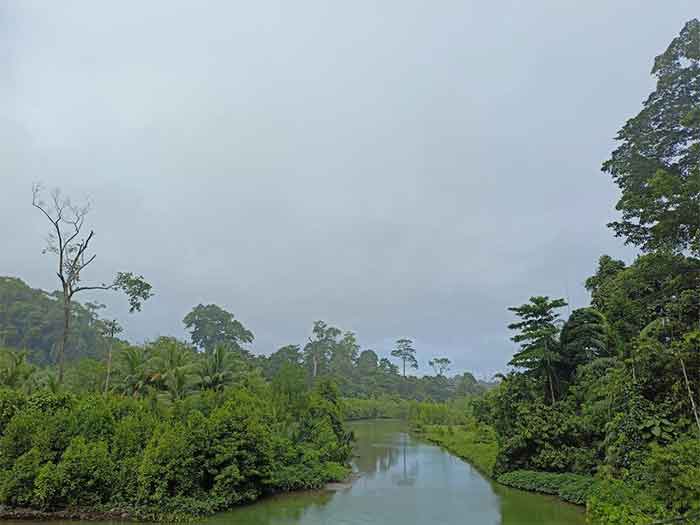To
Smt Droupadi Murmu
President of India
Rashtrapati Bhawan
Respected Rashtrapati Ji,
Subject:- A mega Infrastructure project being undertaken by the government in Great Nicobar Island, without prior consultation with the NCST, would be violative of the Constitutional mandate and adversely impact the lives of the local tribals
I wish to express my utmost concern at the manner in which the Union Ministry of Shipping, and the Andaman Islands administration, are rushing through with the project, “Integrated development of International Container Transhipment Terminal (ICTT) 14.2 Million TEU along with Greenfield International Airport (4000 Peak Hour) Passengers”. The project will adversely impact the local tribal groups and it is being undertaken without prior consultation with the National Commission for the Scheduled Tribes (NCST), as mandated in Article 338A(9).
At the instance of the Ministry of Shipping, the SPM Port Kolkata and the Andamans Islands administration have since jointly issued an Expression of Interest (EOI) for setting up the project in question and it appears that the project activity would be set in motion very soon.
There are two tribal communities on the island, namely, Shompens [recognised as a Particularly Vulnerable Tribal Group (PVTG)], and Nicobarese, both notified as members of the Scheduled Tribes under Article 342(1) of the Constitution, who have faced serious intrusions into their habitat over the years, from outsiders, including tourists.
The NCST, an authority set up under Article 338A(1) of the Constitution, has interacted with these tribal groups, studied them in detail (https://ncst.nic.in/sites/default/files/2017/Seminar/Amit_Delhi_Presentation_on_Shompen_NCST_Seminar_June_2018.pdf) and is thus fully aware of their problems. The NCST has exhorted the government, time and again, to ensure that every possible measure is taken to address the local tribal groups’ problems and extend protection to them in every respect.
A large influx of outside population into these islands, degradation of the local forests that constitute the habitat of the tribals and an overall disruption to their lives, will endanger their culture and their way of living. The NCST would be the most appropriate institution that can offer considered views in the matter.
Under Article 338A(9), it is mandatory that the Union and the States consult the NCST on all matters that concern the tribals.
Article 338A(9) reads as follows:
“The Union and every State Government shall consult the Commission on all major policy matters affecting Scheduled Tribes”
At no stage of processing of this mega project, had any Ministry cared to take the NCST into confidence.
The total area of Great Nicobar Islands is 92,100 hectares (ha), out of which 75,000 ha has been statutorily notified as a “tribal reserve”. The mega project in question extends over 16610 ha, which constitutes 18% of the area of the island itself and it necessarily intrudes into the tribal reserve, which implies that the habitat of the tribals would get adversely affected. It will introduce irreversible changes to the tribal reserve and the lives of the tribals.
About 8410 ha of the Tribal Reserve (more than 11%) are being de-notified by the A&N administration to accommodate the project.The Shompen habitat in Great Nicobar island is an important biological hotspot. The Anthropological Survey of India (AnSI) has attempted a conceptual framework for laying out a comprehensive policy for promoting the well-being of the Shompens and it needs to be further followed up. Those who conceived the project unilaterally, had not cared to consult the AnSI at any stage of designing it.
Andaman and Nicobar Islands (Protection of Aboriginal Tribes) Regulation, 1956 overrides all other laws:
As far as the statutory safeguards applicable to the islands are concerned, the Anadaman and Nicobar Islands (Protection of Aboriginal Tribes) Regulation, 1956 (PAT56) governs the same. This was a Regulation promulgated under Article 240 of the Constitution. Regulation 11 of this reads as follows:
“The provisions of this Regulation and of any rule made thereunder shall have effect notwithstanding anything inconsistent therewith contained in any other law for the time being in force or in any instrument having effect by virtue of any such law, or in any usage or agreement, or in any decree or order of any court or other authority”
This implies that PAT56 has an overriding effect over all other laws applicable elsewhere. Strictly, laws such as the Mines & Minerals (Development & Regulation) Act, 1957 (MMDRA57), Forest (Conservation) Act, 1980 (FCA80) and the Environment (Protection) Act, 1986 (EPA86) are not automatically applicable to A&N Islands, where PAT56 is in force and, under Regulation 11 of that Act, PAT56 overrides all other laws.
The Union Ministry of Environment, Forests & Climate Change (MEFCC) had cleared the mega project in an undue haste, without taking the local tribal groups into confidence, nor consulting the AnSI and, most important, without consulting the NCST. It is therefore prima facie violative of Article 338A(9) of the Constitution and PAT56, for MEFCC to have summarily issued clearances for this project, either under EPA86 or under FCA80. Had the MEFCC consulted the NCST and the Union Ministry of Tribal Affairs beforehand, they would have obtained valuable insights and been in a position to modify the project appropriately.
The haste in which the MEFCC had cleared the project, without respecting established environmental norms, could be appreciated by the Ministry’s contrived attempt to justify the loss of 12187 ha of forests in Great Nicobar by satisfying itself with compensatory afforestation, as per the apex court’s directions, in far away Haryana State! How can afforestation in Haryana compensate a Shompen’s loss of his/her habitat in Great Nicobar?
Moreover, where there are traditional forest dwellers, the provisions of the Scheduled Tribes And Other Traditional Forest Dwellers (Recognition Of Forest Rights) Act, 2006 (FRA) get attracted, by which the Shompens and the Nicobarese get both individual and community forest land occupation rights. These provisions stand infringed in the case of the mega project in question.
On many important matters concerning the tribals, of late, I find that the concerned Ministries have not been consulting the NCST.
For example, when MEFCC had unilaterally amended the Forest (Conservation) Rules in June this year, the NCST had objected to it and addressed a letter No. NCST-04/0mon/4/2022-RMDC dated 26-9-2022, expressing their concerns about the likely implications of the amendment for the tribals, asking the MEFCC to keep the Rules in abeyance. Apparently, the latter has not heeded NCST’s advice.
There have been multiple violations of PAT56 itself. For example, the A&N administration had earlier issued the A & N Islands Minor Minerals Rules in 2007 under MMDRA57, which are prima facie non-compliant with Regulation 11 of PAT56. Under these Rules, the local administration has been issuing mining and quarrying licenses, which are not legally valid.
The project owes its origin to Niti Ayog’s so-called “Holistic Development of Great Nicobar Island at Andaman & Nicobar Islands Pre-Feasibility Report”, which was formulated without consulting the NCST and without obtaining inputs from the AnSI. How can there be any “holistic” development of the islands, without any consideration for the local tribals and their views?
Considering that the project involves an investment of around Rs 75,000 Crores, it would lead to a huge influx of outsiders, whose presence would impact the Tribal Reserve and hurt the interests of the local tribal groups. According to one estimate (https://scroll.in/article/1038263/planned-destruction-of-adivasi-culture-and-lives-experts-raise-alarm-over-great-nicobar-project), the project seeks to increase the population of the ecologically-sensitive island from the current 8,000 to more than 3.5 lakh in the next three decades. This is an increase of over 4000%. It is only marginally less than the entire population of the Andaman and Nicobar islands, which was 3.8 lakh as per the 2011 Census“. Great Nicobar island with a UNESCO recognised large Biosphere of an extent of 73279 ha and a Tribal Reserve of 75100 ha cannot obviously carry such a population load without affecting the biosphere and without affecting the tribal communities.
Those who are pushing forward this project in such haste may argue that the project has national security implications. While the security of the nation is no doubt of paramount importance, in a Parliamentary democracy like ours, governed by the rule of law embodied in the Constitution, there are formal systems of consultation with different Constitutional authorities and consultation with the local communities who are the most important stakeholders, that cannot be bypassed. The least that the Central government and its agencies ought to have done in this matter was to take them the NCST and the local tribals in confidence, prior to launching the project
A word in particular about the Shompens and the Nicobarese tribal communities who are yet to integrate with the rest of the people. They are small groups in terms of their population but are as important as anyone else in the country. Their views, explicitly expressed or otherwise, need to be given as much respect as anyone else’s. Their development concerns need to be approached in a highly sensitive manner. Unilateral decisions in the name of security, that ignore their feelings and disrupt their lives, cannot be a part of either “holistic development” of the island, as contended by Niti Ayog, or can they be justified on considerations of national security, as the nation’s security needs to be built assiduously on the security of each and every part of its people and their individual feeling of well-being.
Against this background, I would earnestly appeal to you to intervene in the matter and ensure that those dealing with this mega project are in compliance with the relevant Constitutional and statutory requirements and are in harmony with the basic norms of democracy.
Under the Constitution, the high office of the President of India has not only the authority but also the obligation to ensure the well-being of the tribals in every nook and corner of the country, irrespective of their numbers, and irrespective of whether they have raised their voice or not.
I am sure that your timely intervention would make every Shompen and every Nicobarese on Great Nicobar Island feel secure and protected. Only then, we can celebrate national security, firmly founded on a democratic system.
Respectfully,
E A S Sarma, Former Commissioner (Tribal Welfare) Govt of Andhra Pradesh (AP) & Former Secretary to Government of India, Visakhapatnam













































